How to build wordpress
First of all, we need to set up a local environment and download the program files. In the previous article "How to install a local website debugging environment", we have already introduced the installation of the local debugging environment. I will not go into details here. The editor uses phpstudy as Example to install. The WordPress program is installed. In the previous article "Which CMS program is better for optimization?" I also introduced that the WordPress program is mainly used to build blog sites. Without further ado, let's follow.

1. Go to the WordPress Chinese official website to download the program file. After clicking the download button, the program file will be automatically downloaded to your local area;
2. Download it Cut the file to the WWW directory in the phpstudy environment (it is the WWW directory if no changes are made), then compress the compressed file, and cut all the files in the decompressed wordpress folder to the WWW directory Down.
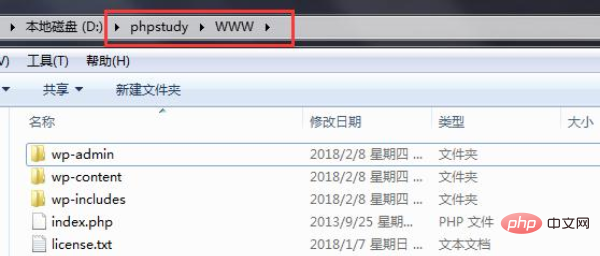
3. Then start phpstudy and visit http://127.0.0.1/ or http://localhost/ in the browser (this is the default access address, if modified Pass the port, just add the port at the end. For example, the editor has changed port 80 to port 6060 here).
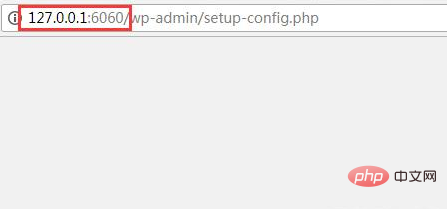
Related recommendations: "WordPress Tutorial"
4. The browser will automatically jump to the program installation interface, and then click Now start.
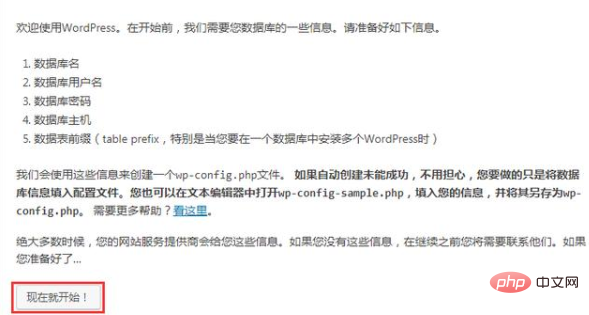
5. Fill in the corresponding information. It should be noted here that the database needs to be created manually. Create a new database in the phpstudy>MySQL>data folder. Folder (can only have an English name). What I created here is a folder named WordPress.
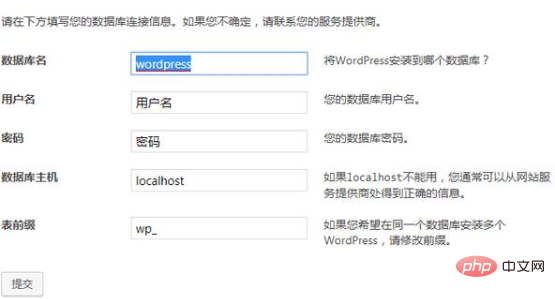
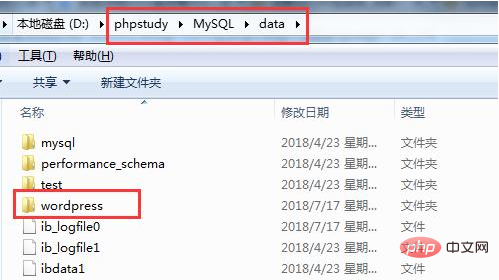
6. In the box where you filled in the information previously, the database name is the name of the database folder created in the previous step, the user name and The password defaults to root (the default is different in different environments, phpstudy defaults to root), the table prefix does not need to be changed unless there are special requirements, and the database host does not need to be changed. Then click Submit.
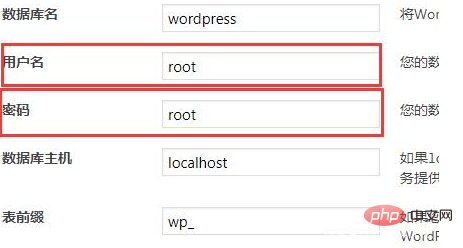
#7. If there is no error, this interface will appear, then click Install Now.
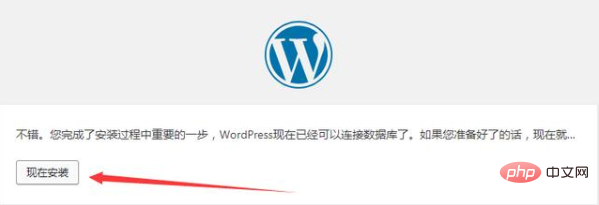
8. The next step is to set the site title, users, login password and other information. It should be noted that the login password cannot contain Chinese characters, and it is best to fill in your own email The email address can be used to retrieve the login password. The last one is visibility to search engines. If you do not want search engines to index the site, check it; otherwise, do not check it. For SEO sites, do not check it. Then click Install WordPress.
The above is the detailed content of How to build wordpress. For more information, please follow other related articles on the PHP Chinese website!

Hot AI Tools

Undresser.AI Undress
AI-powered app for creating realistic nude photos

AI Clothes Remover
Online AI tool for removing clothes from photos.

Undress AI Tool
Undress images for free

Clothoff.io
AI clothes remover

Video Face Swap
Swap faces in any video effortlessly with our completely free AI face swap tool!

Hot Article

Hot Tools

Notepad++7.3.1
Easy-to-use and free code editor

SublimeText3 Chinese version
Chinese version, very easy to use

Zend Studio 13.0.1
Powerful PHP integrated development environment

Dreamweaver CS6
Visual web development tools

SublimeText3 Mac version
God-level code editing software (SublimeText3)

Hot Topics
 1664
1664
 14
14
 1423
1423
 52
52
 1317
1317
 25
25
 1268
1268
 29
29
 1246
1246
 24
24
 How to adjust the wordpress article list
Apr 20, 2025 am 10:48 AM
How to adjust the wordpress article list
Apr 20, 2025 am 10:48 AM
There are four ways to adjust the WordPress article list: use theme options, use plugins (such as Post Types Order, WP Post List, Boxy Stuff), use code (add settings in the functions.php file), or modify the WordPress database directly.
 How to build a website for wordpress host
Apr 20, 2025 am 11:12 AM
How to build a website for wordpress host
Apr 20, 2025 am 11:12 AM
To build a website using WordPress hosting, you need to: select a reliable hosting provider. Buy a domain name. Set up a WordPress hosting account. Select a topic. Add pages and articles. Install the plug-in. Customize your website. Publish your website.
 How to change the head image of the wordpress theme
Apr 20, 2025 am 10:00 AM
How to change the head image of the wordpress theme
Apr 20, 2025 am 10:00 AM
A step-by-step guide to replacing a header image of WordPress: Log in to the WordPress dashboard and navigate to Appearance >Theme. Select the topic you want to edit and click Customize. Open the Theme Options panel and look for the Site Header or Header Image options. Click the Select Image button and upload a new head image. Crop the image and click Save and Crop. Click the Save and Publish button to update the changes.
 What are the plugins for wordpress blocking ip
Apr 20, 2025 am 08:27 AM
What are the plugins for wordpress blocking ip
Apr 20, 2025 am 08:27 AM
WordPress IP blocking plugin selection is crucial. The following types can be considered: based on .htaccess: efficient, but complex operation; database operation: flexible, but low efficiency; firewall: high security performance, but complex configuration; self-written: highest control, but requires more technical level.
 How to view the front-end of WordPress
Apr 20, 2025 am 10:30 AM
How to view the front-end of WordPress
Apr 20, 2025 am 10:30 AM
You can view the WordPress front-end by logging into the dashboard and switching to the View Sites tab; automate the viewing process with a headless browser; installing the WordPress plugin to preview the front-end within the dashboard; viewing the front-end via a local URL (if WordPress is set locally).
 How to import the source code of wordpress
Apr 20, 2025 am 11:24 AM
How to import the source code of wordpress
Apr 20, 2025 am 11:24 AM
Importing WordPress source code requires the following steps: Create a sub-theme for theme modification. Import the source code and overwrite the files in the sub-topic. Activate the sub-theme to make it effective. Test the changes to make sure everything works.
 How to cancel the editing date of wordpress
Apr 20, 2025 am 10:54 AM
How to cancel the editing date of wordpress
Apr 20, 2025 am 10:54 AM
WordPress editing dates can be canceled in three ways: 1. Install the Enable Post Date Disable plug-in; 2. Add code in the functions.php file; 3. Manually edit the post_modified column in the wp_posts table.
 How to import wordpress templates
Apr 20, 2025 am 10:18 AM
How to import wordpress templates
Apr 20, 2025 am 10:18 AM
WordPress templates quickly create professional websites. The steps to import a template include: select and download the template. Log in to the WordPress dashboard. Select Theme from the Appearance menu. Click "Add New Theme". Click "Upload topic" and select the downloaded template .zip file. Click "Install Now". Click the "Activate" button. Customize the templates through the Customize menu.




